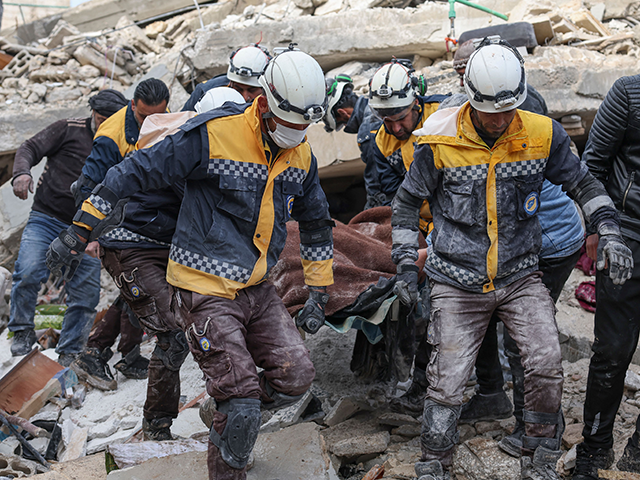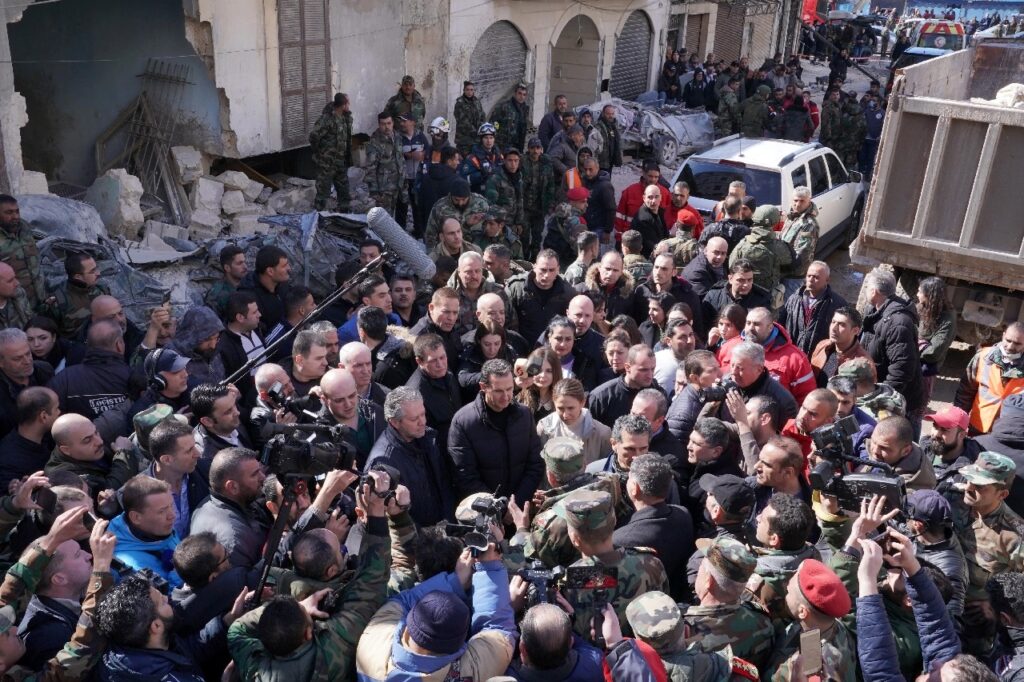The famed Syrian civil defense organization known as the White Helmets on Tuesday condemned the United Nations for its “shocking” decision to work with dictator Bashar Assad on earthquake relief.
The White Helmets said the U.N. was setting Assad up to reap political benefits by letting him posture as a humanitarian savior.
U.N. Secretary-General Antonio Guterres announced on Monday that Assad’s regime agreed to open two new border crossings to Turkey for the next three months. Until now, humanitarian missions have been making do with a single authorized border crossing.
“Opening these crossing points — along with facilitating humanitarian access, accelerating visa approvals and easing travel between hubs — will allow more aid to go in, faster,” Guterres said.
The @UN says #Syria agrees to open 2 new border crossing points into rebel-held northwest for #earthquake aid.
UN convoys have been restricted to one crossing into NW as per a Security Council resolution.
NW had no aid for days after the quake.https://t.co/kHInzO61XP
— Kareem Chehayeb | كريم شهيب (@chehayebk) February 14, 2023
The new border crossings were evidently negotiated by U.N. humanitarian director Martin Griffiths, who met with Assad in Damascus after surveying damage from the powerful earthquakes that ravaged parts of Turkey and Syria last week.
Syrian Ambassador to the U.N. Bassam Sabbagh told reporters that Assad held a “positive and constructive meeting” with Griffiths. The dictator agreed there was a clear need for “urgent aid to enter all regions of Syria, including those under occupation and under control of the armed terrorist groups.”
“Based on that, Syria supports the entry of humanitarian aid into the region through all possible cross points whatever – from inside Syria, or across the borders – for the period of three months to ensure the delivery of humanitarian aid to our people,” Sabbagh said.
The U.S. State Department applauded the agreement and hoped Assad was “serious” about disaster relief, but the opposition-run White Helmets were appalled.
“This is shocking and we are at loss at how the U.N. is behaving,” said Raed al-Saleh, head of the White Helmets, whose formal name is Syria Civil Defense.
Syrian rescue group criticises UN over Assad say on aid deliveries https://t.co/RtsfsKKOVl
— Dr. Zaher Sahloul (@sahloul) February 14, 2023
Like many of the Syrian opposition groups still fighting against Assad’s rule — some of which are decidedly not humanitarian organizations – Saleh worried the U.N. was giving Assad a golden opportunity for “free political gain” by allowing the murderous dictator to claim credit for rescue and relief operations.
Saleh was nonetheless appreciative of the humanitarian deliveries, welcoming aid shipments from Saudi Arabia and Qatar that arrived in opposition-held disaster zones ahead of the U.N. missions.
The White Helmets gained international recognition by working to rescue civilians caught in the crossfire of the Syrian civil war. The Assad regime considers the White Helmets to be treasonous puppets of hostile Western powers and supporters of “terrorism.”
The White Helmets quickly became involved with earthquake disaster relief, marshaling an estimated 3,000 volunteers from various walks of life to help with clearing away debris, rendering medical assistance to quake victims, and restoring damaged infrastructure.
The group described the aftermath of the earthquakes as a “Herculean task” because so many hospitals and clinics were destroyed, the quake-hit areas were already short on food and medical care, and fuel supplies for rescue vehicles are difficult to source. The White Helmets are asking for international donors to support their efforts.
Some members of the U.N. Security Council were suspicious of the Assad regime’s claims to benevolence, recommending alternate plans be drawn up in case Damascus changes its mind about cooperating with relief efforts into rebellious territory.
French Ambassador to the U.N. Nicolas de Riviere insisted the earthquake is “a humanitarian tragedy that should not be politicized.” He urged the Security Council to consider a resolution that would unilaterally open new border crossings into Syria if Assad does not keep his promises – and defend those crossings with military force if needed.
U.N. spokesman Stephane Dujarric noted on Monday that even with more border crossings available, some aid convoys are being blocked by rebel groups, notably including al-Qaeda offshoot Hayat Tahrir al-Sham.


COMMENTS
Please let us know if you're having issues with commenting.